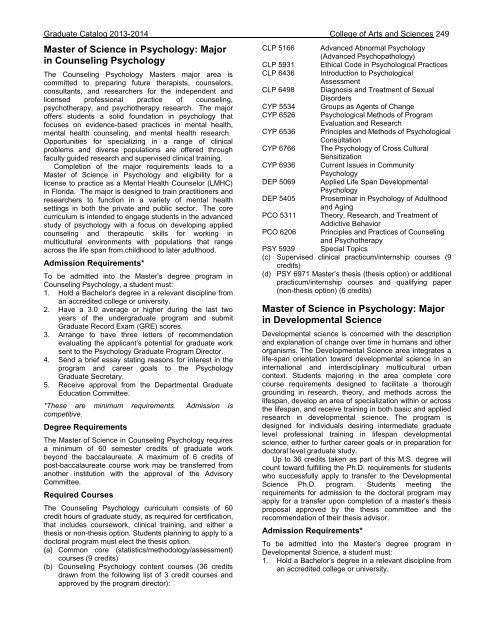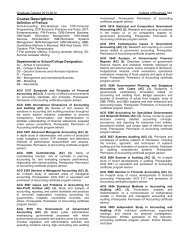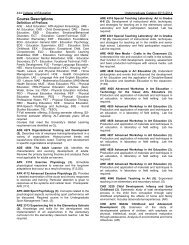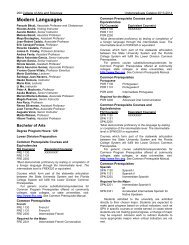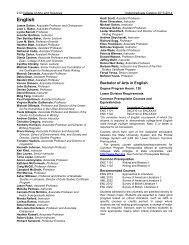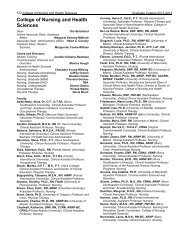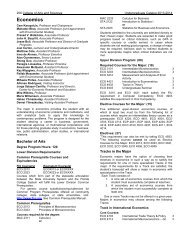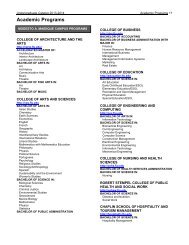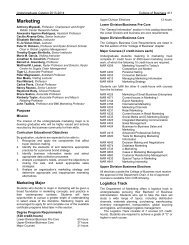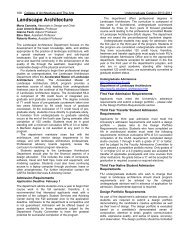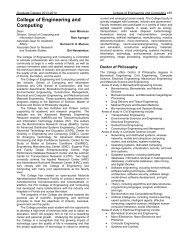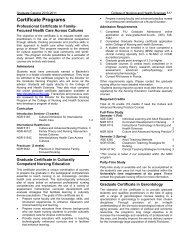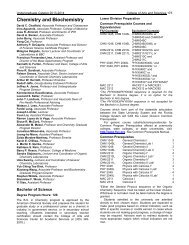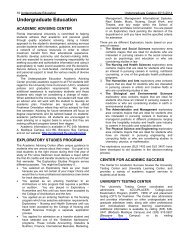Psychology - Course Catalogs
Psychology - Course Catalogs
Psychology - Course Catalogs
Create successful ePaper yourself
Turn your PDF publications into a flip-book with our unique Google optimized e-Paper software.
Graduate Catalog 2013-2014 College of Arts and Sciences 249<br />
Master of Science in <strong>Psychology</strong>: Major<br />
in Counseling <strong>Psychology</strong><br />
The Counseling <strong>Psychology</strong> Masters major area is<br />
committed to preparing future therapists, counselors,<br />
consultants, and researchers for the independent and<br />
licensed professional practice of counseling,<br />
psychotherapy, and psychotherapy research. The major<br />
offers students a solid foundation in psychology that<br />
focuses on evidence-based practices in mental health,<br />
mental health counseling, and mental health research.<br />
Opportunities for specializing in a range of clinical<br />
problems and diverse populations are offered through<br />
faculty guided research and supervised clinical training.<br />
Completion of the major requirements leads to a<br />
Master of Science in <strong>Psychology</strong> and eligibility for a<br />
license to practice as a Mental Health Counselor (LMHC)<br />
in Florida. The major is designed to train practitioners and<br />
researchers to function in a variety of mental health<br />
settings in both the private and public sector. The core<br />
curriculum is intended to engage students in the advanced<br />
study of psychology with a focus on developing applied<br />
counseling and therapeutic skills for working in<br />
multicultural environments with populations that range<br />
across the life span from childhood to later adulthood.<br />
Admission Requirements*<br />
To be admitted into the Master’s degree program in<br />
Counseling <strong>Psychology</strong>, a student must:<br />
1. Hold a Bachelor’s degree in a relevant discipline from<br />
an accredited college or university.<br />
2. Have a 3.0 average or higher during the last two<br />
years of the undergraduate program and submit<br />
Graduate Record Exam (GRE) scores.<br />
3. Arrange to have three letters of recommendation<br />
evaluating the applicant’s potential for graduate work<br />
sent to the <strong>Psychology</strong> Graduate Program Director.<br />
4. Send a brief essay stating reasons for interest in the<br />
program and career goals to the <strong>Psychology</strong><br />
Graduate Secretary.<br />
5. Receive approval from the Departmental Graduate<br />
Education Committee.<br />
*These are minimum requirements. Admission is<br />
competitive.<br />
Degree Requirements<br />
The Master of Science in Counseling <strong>Psychology</strong> requires<br />
a minimum of 60 semester credits of graduate work<br />
beyond the baccalaureate. A maximum of 6 credits of<br />
post-baccalaureate course work may be transferred from<br />
another institution with the approval of the Advisory<br />
Committee.<br />
Required <strong>Course</strong>s<br />
The Counseling <strong>Psychology</strong> curriculum consists of 60<br />
credit hours of graduate study, as required for certification,<br />
that includes coursework, clinical training, and either a<br />
thesis or non-thesis option. Students planning to apply to a<br />
doctoral program must elect the thesis option.<br />
(a) Common core (statistics/methodology/assessment)<br />
courses (9 credits)<br />
(b) Counseling <strong>Psychology</strong> content courses (36 credits<br />
drawn from the following list of 3 credit courses and<br />
approved by the program director):<br />
CLP 5166 Advanced Abnormal <strong>Psychology</strong><br />
(Advanced Psychopathology)<br />
CLP 5931 Ethical Code in Psychological Practices<br />
CLP 6436 Introduction to Psychological<br />
Assessment<br />
CLP 6498 Diagnosis and Treatment of Sexual<br />
Disorders<br />
CYP 5534 Groups as Agents of Change<br />
CYP 6526 Psychological Methods of Program<br />
Evaluation and Research<br />
CYP 6536 Principles and Methods of Psychological<br />
Consultation<br />
CYP 6766 The <strong>Psychology</strong> of Cross Cultural<br />
Sensitization<br />
CYP 6936 Current Issues in Community<br />
<strong>Psychology</strong><br />
DEP 5069 Applied Life Span Developmental<br />
<strong>Psychology</strong><br />
DEP 5405 Proseminar in <strong>Psychology</strong> of Adulthood<br />
and Aging<br />
PCO 5311 Theory, Research, and Treatment of<br />
Addictive Behavior<br />
PCO 6206 Principles and Practices of Counseling<br />
and Psychotherapy<br />
PSY 5939 Special Topics<br />
(c) Supervised clinical practicum/internship courses (9<br />
credits)<br />
(d) PSY 6971 Master’s thesis (thesis option) or additional<br />
practicum/internship courses and qualifying paper<br />
(non-thesis option) (6 credits)<br />
Master of Science in <strong>Psychology</strong>: Major<br />
in Developmental Science<br />
Developmental science is concerned with the description<br />
and explanation of change over time in humans and other<br />
organisms. The Developmental Science area integrates a<br />
life-span orientation toward developmental science in an<br />
international and interdisciplinary multicultural urban<br />
context. Students majoring in the area complete core<br />
course requirements designed to facilitate a thorough<br />
grounding in research, theory, and methods across the<br />
lifespan, develop an area of specialization within or across<br />
the lifespan, and receive training in both basic and applied<br />
research in developmental science. The program is<br />
designed for individuals desiring intermediate graduate<br />
level professional training in lifespan developmental<br />
science, either to further career goals or in preparation for<br />
doctoral level graduate study.<br />
Up to 36 credits taken as part of this M.S. degree will<br />
count toward fulfilling the Ph.D. requirements for students<br />
who successfully apply to transfer to the Developmental<br />
Science Ph.D. program. Students meeting the<br />
requirements for admission to the doctoral program may<br />
apply for a transfer upon completion of a master’s thesis<br />
proposal approved by the thesis committee and the<br />
recommendation of their thesis advisor.<br />
Admission Requirements*<br />
To be admitted into the Master’s degree program in<br />
Developmental Science, a student must:<br />
1. Hold a Bachelor’s degree in a relevant discipline from<br />
an accredited college or university.


